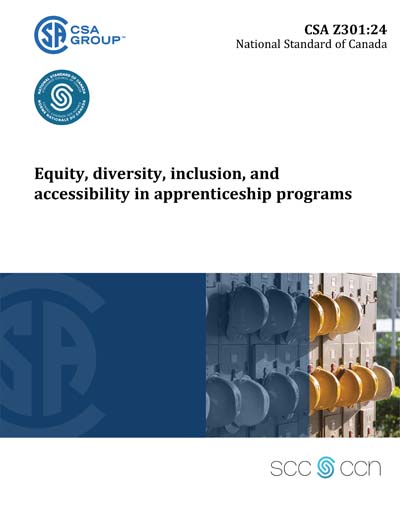Most recent
CSA Z301-2024
Equity, diversity, inclusion, and accessibility in apprenticeship programs
Preface This is the first edition of CSA Z301, Equity, diversity, inclusion, and accessibility in apprenticeship programs. The intent of this Standard is to improve outcomes for apprentices from equity-deserving groups in the skilled trades. Creating more opportunities for these individuals to access and succeed in the skilled trades will lead to more equitable workforces and help employers meet human resource demands for qualified employees. In this edition, "equity-deserving groups" refers to but is not limited to Indigenous, Black and other racialized groups, women, persons with disabilities, 2SLGBTQIA+, and newcomers to Canada. This Standard has been developed to address the low participation and retention rates of these groups in skilled trades and apprenticeships. CSA Group acknowledges that the development of this Standard was made possible by the support of the Canadian District of the United Brotherhood of Carpenters and Joiners of America (UBCJA), and funded in part by the Government of Canada’s Canadian Apprenticeship Strategy. This Standard was prepared by the Technical Committee on Equity, Diversity, Inclusion, and Accessibility in Apprenticeship Programs, under the jurisdiction of the Strategic Steering Committee on Occupational Health and Safety, and has been formally approved by the Technical Committee. This Standard has been developed in compliance with Standards Council of Canada requirements for National Standards of Canada. It has been published as a National Standard of Canada by CSA Group. Scope 1.1 Inclusions This Standard specifies requirements and provides guidelines for equity, diversity, inclusion, and accessibility (EDIA) in apprenticeship programs. This Standard is applicable to all aspects of an apprenticeship system including pre-apprenticeship, classroom learning, mentorship, and on-the-job training delivered in an apprenticeable trade, and for which successful completion of the required stages of apprenticeship and testing is recognized by the apprenticeship authority within the jurisdiction. Note: This covers programming delivered by unions, community colleges, and private trades colleges, and includes related services such as recruitment, admissions, and academic and personal counselling. This Standard can be used in conjunction with an organization’s management systems, human resource programs, and/or occupational health and safety programs, or on its own in the absence of a formal program to support EDIA. 1.2 Exclusions This Standard was written with the context of apprenticeship systems governed by provincial or territorial apprenticeship authorities. While it is intended to be a useful resource, its content might not always apply to other training models (e.g., military, private training, co-ops, informal) for learning in the trades. 1.3 Terminology In this Standard, "shall" is used to express a requirement, i.e., a provision that the user is obliged to satisfy in order to comply with the Standard; "should" is used to express a recommendation or that which is advised but not required; and "may" is used to express an option or that which is permissible within the limits of the Standard. Notes accompanying clauses do not include requirements or alternative requirements; the purpose of a note accompanying a clause is to separate from the text explanatory or informative material. Notes to tables and figures are considered part of the table or figure and may be written as requirements. Annexes are designated normative (mandatory) or informative (non-mandatory) to define their application.
CSA America, Inc. [csa]

